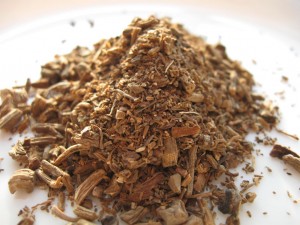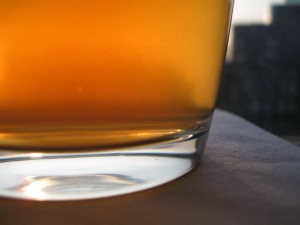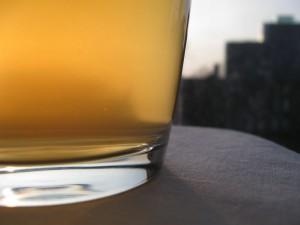Last updated: March 8, 2013
Valerian tea is a caffeine-free tisane made from the root of the plant Valeriana officinalis.
Valerian is a small flowering plant native to Europe that now grows in temperate regions all over the world. It’s sometimes called “garden valerian” “or “garden heliotrope”.
Valerian root is a traditional sleep aid, having been used as an insomnia remedy since at least the 1700s1. There has been some modern medical research investigating valerian root to reduce sleeplessness and anxiety.
I’ll first describe valerian tea and then move on to the medical evidence for valerian tea benefits.
Appearance

Contrast the large pieces of valerian towards the bottom of the image with the very fine pieces towards the top.
Valerian root tea consists of chopped, dried valerian roots. Each root is no thicker than a shoelace. The color is a milk-chocolate light brown.
Different teas will be cut or ground to different levels of fineness. I was approaching the end of my tin of valerian so there were more fine valerian peices than usual. This is important because the finer the pieces of valerian, the faster the tea will infuse. Adjust the infusion times I give later based on how finely cut your valerian is.
The dry tea has a very particular aroma: the primarly smell is wood with notes of evergreen, but lingering at the edges is the most peculiar funk that reminds me of a very fine Parmigiano-Reggiano that has been aged for a long time (perhaps a little too long).
How to make valerian tea
- Use one level teaspoon of valerian root for each cup of tea you plan to make. If you like a stronger flavor you can use a heaped teaspoon or even more, but I recommend starting with a smaller amount.
- Cover the valerian with hot water that’s just below boiling. If you use an electric kettle to heat your water, let it stand for a couple of minutes after boiling.
- Leave the lid on your teapot or french press and let the valerian tea infuse for 5-10 minutes.
- Strain out the valerian root and serve.
Drinking valerian root tea
Color: After infusing for about 7 minutes, the color was a rich golden amber with a very slight cloudiness.
After infusing for 20 minutes, the color was a deeper amber with more brown and orange tones.
Aroma: strong notes of pine with some roast and a little bit of balsamic sticky-sweetness lurking in the background.
Taste: After 7 minutes: the primary note is bitterness. I’m reminded of a strong essential oil like clove or tea tree. There are pine needles in bountiful quantity along with a healthy dose of sandalwood. There’s less funkiness than I expected; the dry valerian smells quite different from how the final infusion tastes.
After 20 minutes, the tea is undrinkably bitter. It tastes like chewing on a Christmas tree. It leaves what feels like an oily residue in the mouth. Very unpleasant.
On the whole, I’d recommend erring on the side of infusing for too short a length of time rather than too long. Valerian root is full of bold, breakout flavors that don’t need long to form a strong brew.
In moderation, I found the overall flavor pleasant but something of an acquired taste. It’s something I might like to have one cup of before bed, but it’s not something I would drink five or six cups of while working.

Valerian tea infused for 20 minutes. Note the deeper, fuller color. I wouldn’t recommend infusing for this long.
Valerian tea benefits
There have been medical studies of valerian root as i) a sleep aid and ii) for reducing anxiety.
Valerian for sleep
Valerian supplements or tea are commonly recommended by doctors as a first-line treatment for insomnia2. In 2010 a group of Spanish scientists performed a meta-analysis of 18 clinical trials testing the effect of valerian root on sleep quality. They concluded:
In conclusion, the qualitative dichotomic results suggest that Valerian would be effective for subjective improvement of insomnia, although its effectiveness has not been demonstrated with quantitative or objective measurements. Nevertheless, its use can be considered for some patients given its safety. The last clinical trials of high methodological quality and sufficient sample size are not conclusive. We recommend future investigations oriented toward improving insomnia with other more promising treatments.
In other words, the data suggest that when you assess the effectiveness of valerian by asking people who have taken it if it helps them sleep, it appears to be effective. However, if you assess the effectiveness of valerian using objective measurements like how long it takes people to get to sleep, it appears ineffective. You are free to draw your own conclusions on whether or not valerian tea is worth trying as a sleep aid.
Valerian for anxiety
Valerian tea has been used for centuries as a traditional treatment for anxiety3. However, there is a disappointing lack of medical evidence to support valerian for anxiety. Some trials combine valerian with other herbs like St. John’s Wort3which makes it impossible to attribute the results of the trial to valerian itself. In fact, a 2006 meta-analysis found only one small clinical trial of valerian for anxiety that was of sufficient quality to draw evidence from.
Since only one study is included in this review, there is insufficient evidence to draw any conclusions on the efficacy or safety of valerian in comparison to placebo or diazepam for anxiety disorders.
Randomised controlled trials are needed involving larger samples and comparing valerian to placebo and other available interventions, such as antidepressants, for the treatment of anxiety disorders.
There simply is not enough clinical data to reliably indicate whether or not valerian tea has any effect on anxiety.
Valerian root side effects
The consensus of medical opinion is that valerian root and valerian tea are safe when taken at a recommended dosage by otherwise healthy adults.
A meta-analysis of 18 clinical trials of valerian as a sleep aid found the following when it came to side effects:
[The side effects] are usually low intensity and no different from those seen with the placebo.
A 2007 meta-analysis of 37 medical trials found the following:
The studies reviewed support the safety of valerian. The most common side effects were mild and tended to be either mild neurological symptoms (dizziness, headache, drowsiness) or gastrointestinal (GI) symptoms (nausea, diarrhea). [...] no hepatic symptoms or changes in liver function were reported in the research literature reviewed.
It’s worth noting that these kinds of side effects (dizziness, headache etc.) are typical in any medical trial: they’re experienced both by people taking the supplement and people taking the placebo. The revealing statistic is not the incidence of mild side effects for a supplement, but the incidence of mild side effects compared to placebo. The 2007 study does not indicate that valerian caused significant side effects when this comparison is made, with the exception of some morning sleepiness4.
Valerian overdose
Overdosing on valerian is most likely not a realistic concern when drinking valerian tea unless you were making a concerted effort to do just that. You would very likely make yourself sick before you managed to drink enough of the tea to put yourself at risk.
However, there is one report of valerian overdose by a man taking valerian supplements. After taking “20 times the recommended therapeutic dose” he experienced “mild symptoms, all of which resolved within 24 hours”5.
Valerian and alcohol (and other medication)
Because valerian root extracts and valerian tea are thought to increase drowsiness, they should not be taken with sedating substances such as alcohol, antihistamines or benzodiazepines4.
Additionally, the ability of valerian products to increase the effects of other kinds of medication are not fully understood, so you should consult your doctor before trying valerian if you’re currently taking medication4.
Final thoughts
Valerian tea is a really interesting tisane. It has a unique and somewhat challenging taste that people will have strong positive or negative feelings about. I enjoy valerian tea occasionally, but it’s not an everyday tisane for me. I suppose in that regard it’s a little like the lapsang souchong of herbal teas.
The medical evidence is a little underwhelming. There’s some support for the idea that valerian tea can help you sleep, but not much. In my opinion, it’s worth trying as a safe and inexpensive first defense against sleeplessness.
- Effectiveness of Valerian on insomnia: a meta-analysis of randomized placebo-controlled trials [↩]
- Complementary and alternative medicine for sleep disturbances in older adults [↩]
- Nutritional and herbal supplements for anxiety and anxiety-related disorders: systematic review [↩] [↩]
- A systematic review of valerian as a sleep aid: safe but not effective [↩] [↩] [↩]
- Valerian overdose: a case report [↩]

